Global Baptists Gather Down Under to Challenge Injustices and Nationalism
As thousands of Baptists from 130 nations gathered in Brisbane, Australia, for the opening of the Baptist World Congress earlier this month, a local leader offered an acknowledgment that the land the city was built on previously belonged to the Jagera and Turrbal peoples. Also recognizing the Aboriginal and Torres Strait people — other indigenous Australian groups — she added, “We pay respect to their elders, past and present.”
“They are the storytellers of creation stories and truthtellers of our oral histories,” she added. “Why do we acknowledge? Acknowledgments bring the spirit of land and country alive. It creates an atmosphere and attitude of honor, appreciation, and respect for people and country.”
Mixing indigenous Australian instruments and dance in with contemporary songs, guitars, drums, a saxophone, and a cello, the gathering also started with a celebration of the wide diversity of those who had trekked to Australia. Individuals paraded in with a banner representing each nation present, featuring the country’s name and an animal or plant from that land. People from around the world, carrying in symbols of all creation to worship together.
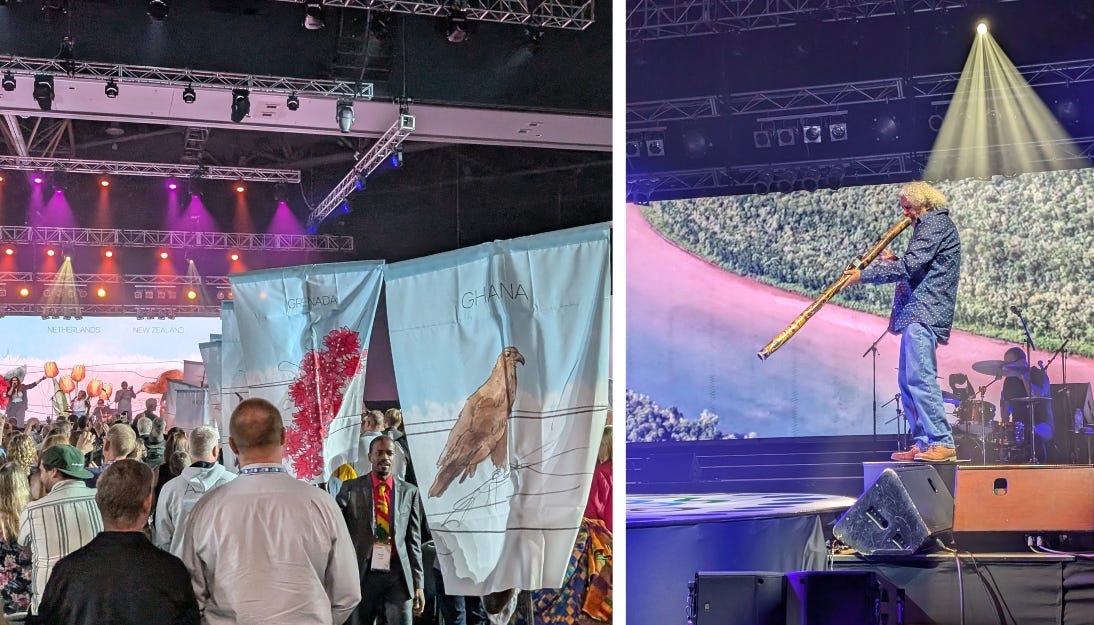
Behind the preachers throughout the week — and on bags and programs carried by attendees — was the logo for the gathering, which was created by an indigenous Australian artist.
All of this fit with a resolution passed by the Baptist World Alliance’s general council during a 2023 meeting in Stavanger, Norway, to encourage work toward “dignity and justice for indigenous peoples.” The resolution, which I helped craft as the chair of the Resolutions Committee for the past five years, denounces the “Doctrine of Discovery” and injustices against indigenous peoples, urges reparative efforts today, and encourages land acknowledgments. As the resolution notes, this is part of what it means to be a Christian who “celebrates the rich diversity of humans made in the image of God around the world, as seen in every nation, tribe, people, and language.”
Such celebration was on display in many ways during the weeklong gathering in Brisbane, singing hymns and hearing the Bible read in multiple languages. But it was also a time to consider ways to work together to impact the world and address significant challenges like Christian Nationalism. As Rick Warren put it during the opening night, “Diversity was God’s idea. … If we harmonize in music, why can we not harmonize in mission?” So this issue of A Public Witness heads to the land down under to offer highlights from a global gathering where Christians came to worship, fellowship, dialogue, learn, and strategize together.
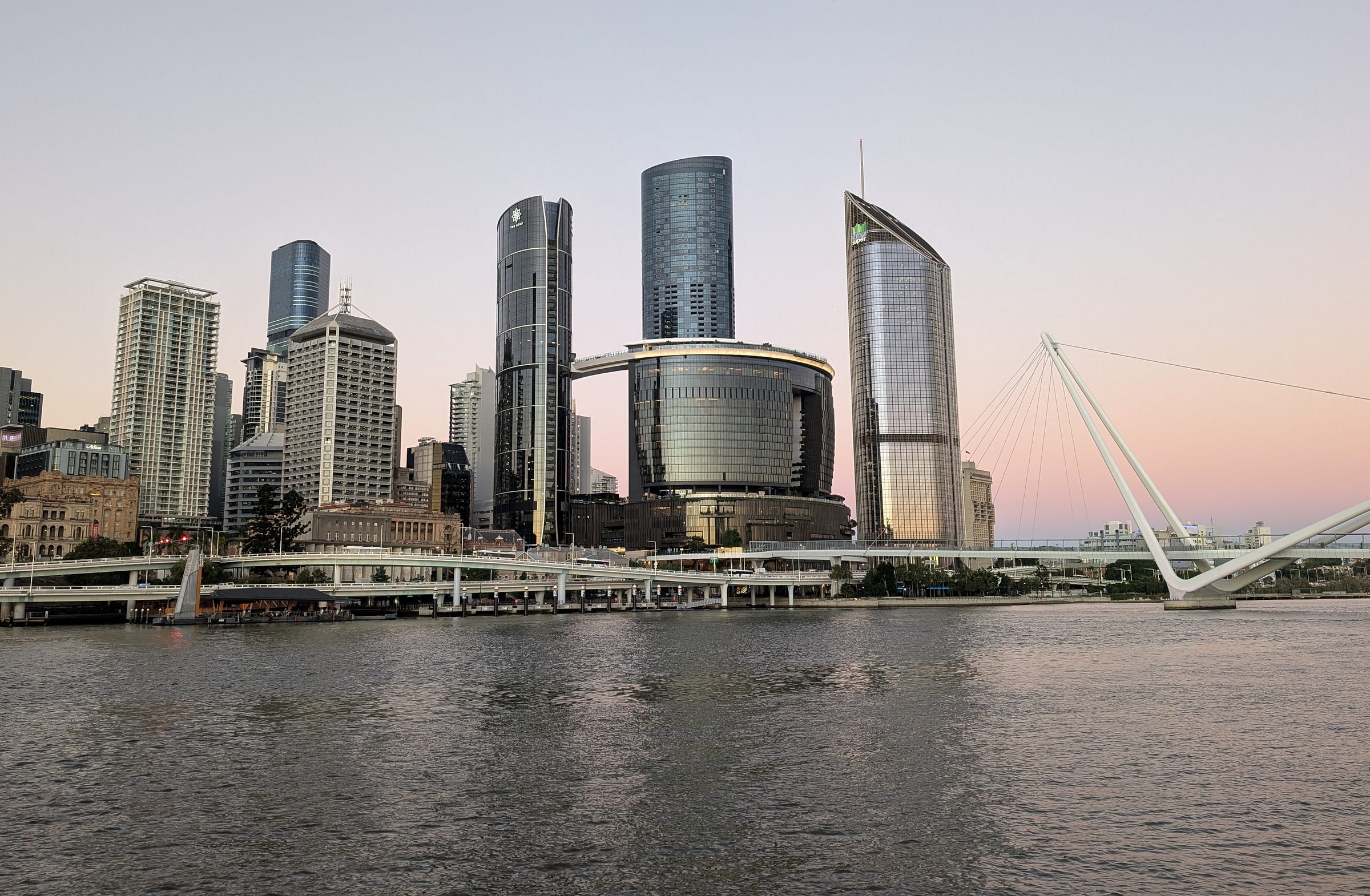
Challenging Injustices
Although coming together to experience and celebrate a diversity of languages and worship styles was an important part of the gathering in Brisbane, many preachers and workshop leaders emphasized the importance of working together to challenge systemic injustices. For instance, Jennifer Lau, executive director of Canadian Baptist Ministries, argued that following Jesus means Christians must also engage in the world to help those who are suffering.
“We cannot say that we follow a suffering savior if we are blind to the suffering of the people that he loved so much he gave his life for them. His vision of freedom is fundamental to how we understand what it means to bear witness to God in a world rife with Injustice,” she argued. “In a world as broken as ours, we do not have the luxury of dismissing freedom as merely spiritually relevant or maybe an abstract concept. As we see the rising authoritarianism and autocracy that has characterized the social-political landscape of this decade and seems to be rising and as we see the continued oppression of people and the suffering of people that has resulted from it, we remember that just as God cares for every part of human life, so must we.”
“If the tumult and uncertainty of the last few months have taught us anything, it’s that we should never presume freedom is a default anywhere but a condition that we must actively pursue and protect and practice in every area of life, both spiritual and social,” she added. “To be a follower of Jesus in our world means that working for freedom becomes our shared communal task. No matter where we are from in this world, we don’t get to look away from the oppression of our brothers and sisters. Ephesians 4:25 tells us firmly that we are members of one another. We are members; we are not bystanders. We are not observers, but we are full participants in the good of humanity. Because no one is free until all of us are free.”
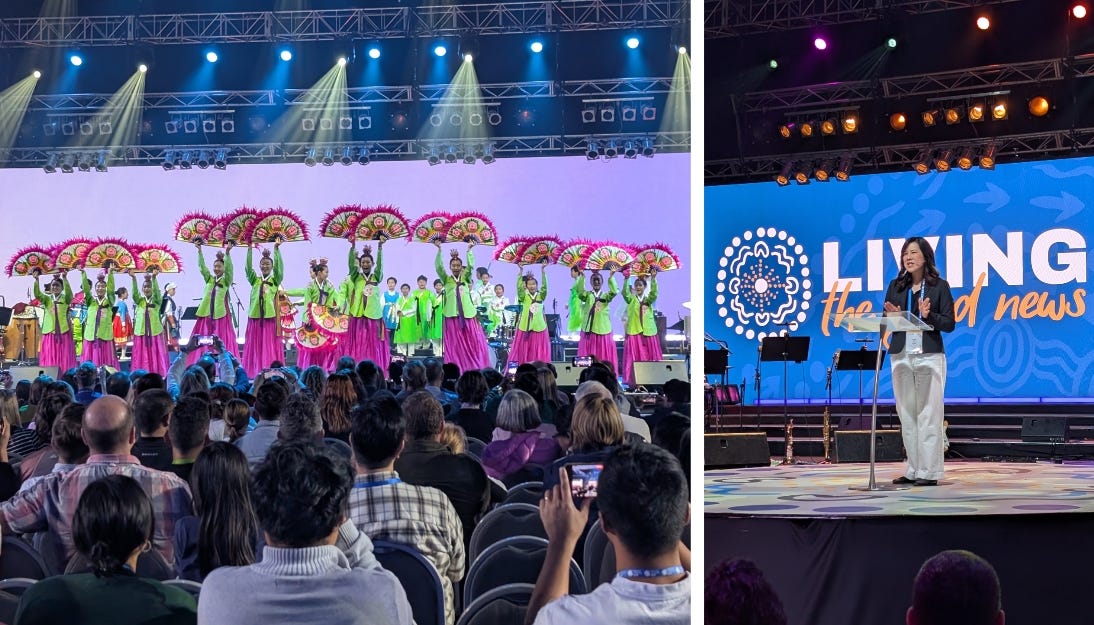
Fitting with this focus of challenging injustices, Baptists from several persecuted and war-torn lands spoke, leading to times of prayer for them. This included individuals ministering India, Lebanon, Myanmar, Nigeria, Syria, and Ukraine. Additionally, Rev. Marsha Scipio, director of the relief and development agency Baptist World Aid, preached about how Christians must work for justice. This can mean, she added, the need to repent from accepting the ways of the world rather than prophetically challenging injustices.
“Just maybe when we talk about the secularization of cities and countries and, in some instances, the departure of the young adults from the church — the nones, those claiming no religion — just maybe we will see that this departure from the church is because the church has chosen to die rather than to repent,” she said. “Maybe the church needs to repent from preaching prosperity without accountability. Maybe the church needs to repent from serving as a repository of handouts for the poor rather than an advocate for the justice systems that liberate those on the margins. Maybe the church needs to repent for preaching a gospel of salvation while omitting the mandate to do justice and to demonstrate the compassion for the least of these.”
“We are living in perilous times that require us to speak the truth. And not just any truth, but a prophetic truth. See, we are in perilous times when there are wars from Sudan to Ukraine, rumors of wars from the Democratic Republic of the Congo to Lebanon. Perilous times. Mass murder from the urban streets of Chicago in the United States to the dirt roads of Gaza,” she added. “Religious persecution from attacks on the church and its leaders in Nicaragua to the wiping out of whole villages in Manipur [in India]. Perilous times. Religious perversion from murder-suicide in the name of God to, yes, Christian Nationalism. We are living in perilous times. Yet, God has given us the church a word to speak to our congregations and communities and, ultimately, the world.”
Scipio’s naming of the danger of Christian Nationalism aligned with a key concern mentioned by many at this gathering as Christians crossed borders to together affirm their global faith over nationalistic commitments.
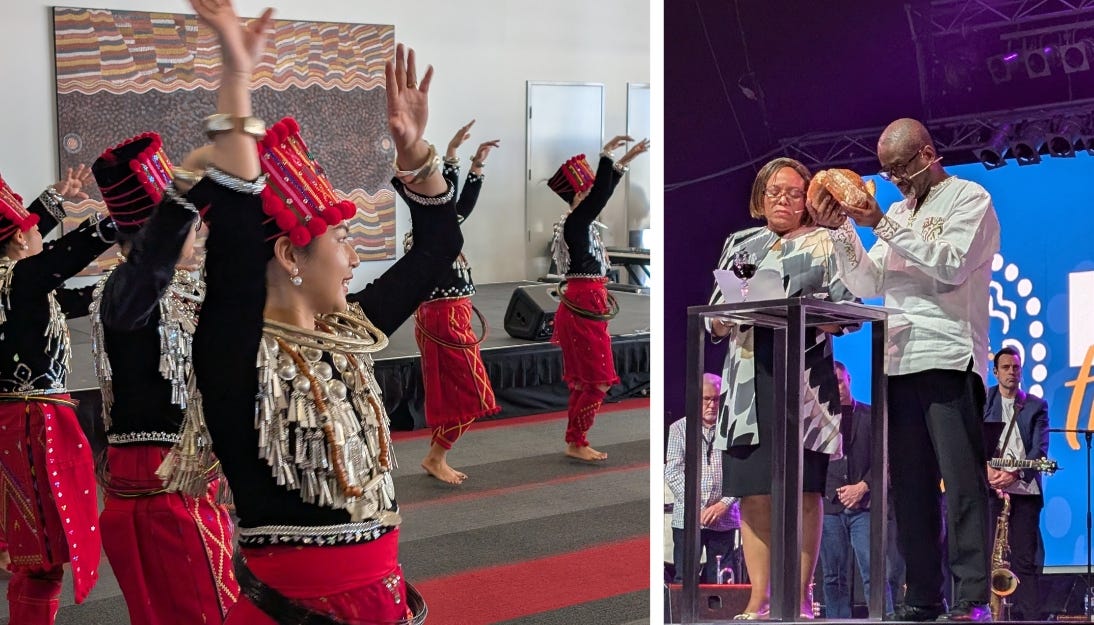
Challenging Christian Nationalism
During the time in Brisbane, the BWA unveiled a “Global Covenant on Freedom of Religion and Conscience,” with the goal of eventually getting a million people to sign it. In the statement, people pledge to defend religious liberty for all, “stand against religious persecution” regardless of who is the target, and “reject all forms of religious nationalism, stereotyping, slander, and scapegoating, and instead seek to build friendships of mutuality and peace.” Members of the BWA’s general council last year passed a resolution condemning Christian Nationalism during a meeting in Lagos, Nigeria.
“Our commitment is to religious freedom for all people of all faiths or of no faith,” BWA General Secretary Elijah Brown declared in Brisbane as he introduced the new statement. “Faith can only flourish when it is not tied to nationalism, including Christian Nationalism.”
Similarly, Rev. Charlie Dates, pastor of Progressive Baptist Church in Chicago, Illinois, warned against churches aligning too closely with government power. Noting “a reason some of our churches are in decline,” he urged those from other countries not to act like many U.S. churches.
“We got a power problem in America,” he explained. “Many of our churches are confusing the power of the gospel with the power of the government. We have moved away from megachurches to MAGAchurches, churches whose steeple spire with both the American flag and the Christian flag as if the two are synonymous, as if the gospel was meant to promote Western civilization. But I want today to tell you that the gospel does not need a political candidate to be effective. No, it’s effective all by itself.”
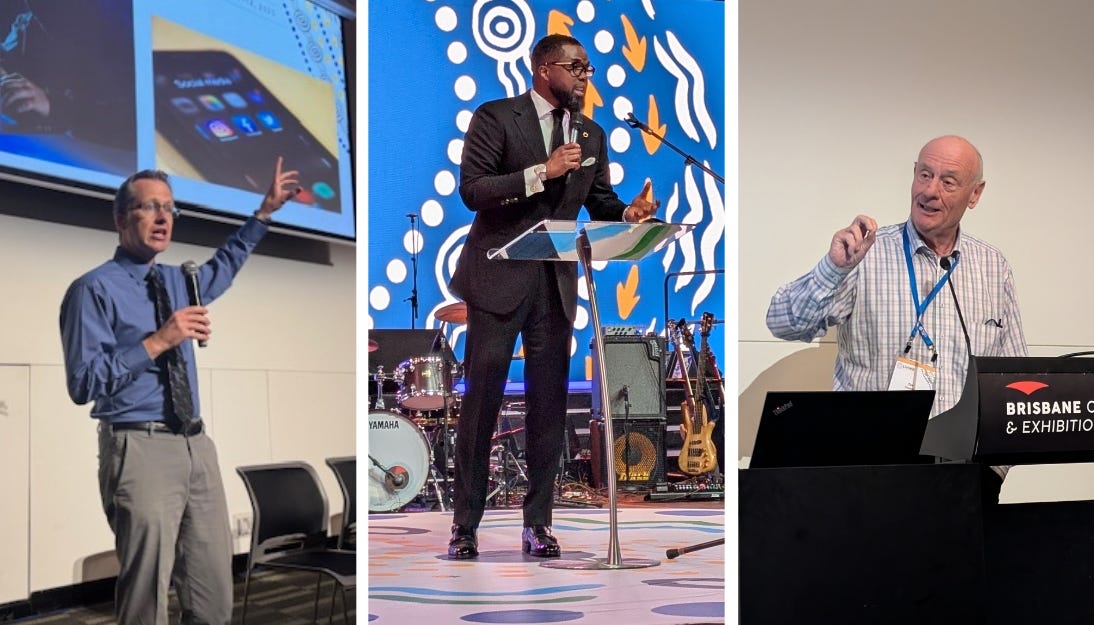
The strongest critique of Christian Nationalism during the gathering came from a politically active Australian minister. Tim Costello is a longtime Baptist pastor who also served as mayor of St. Kilda in the 1990s, led World Vision Australia for 13 years, and in 2014 was voted as one of Australia’s “100 national living treasures.” Costello, who has advocated for humanitarian aid and against gambling, is someone who believes Christians should be engaged in the public square, arguing that if we just ascend the mountaintop and “have an experience of God but that experience of God doesn’t come down from the mountaintop and engage in this world, it’s simply mystical.”
“Faith is personal, but it’s not individualistic,” added Costello, author of The Cost of Compassion. “It profoundly addresses the world. This God who created it, who has redeemed it, is announcing in Jesus a salvation that is public. A way of living that sees true peace, not a peace of religious nationalists.”
Insisting that “Christian faith is prophetic,” Costello warned that “we lose our prophetic voice when we start … listening to the siren songs of religious nationalism.” Prophetic faith, he argued, “addresses principalities and powers. It addresses spiritual wickedness in high places.” Religious nationalism lifts up not the gospel but the nation. He noted how Christians and others are suffering under religious nationalism, pointing to examples of Hindu nationalism in India and Christian Nationalism in Russia. After recounting a 2013 meeting in Moscow when he challenged Vladimir Putin in person for using state power to crack down on religious dissidents, Costello said, “I realized the Russian Orthodox Church became just a department of the state. It had lost all prophetic engagement.”
Costello also noted one other example of Christian Nationalism he’s concerned about in the world: “I’m seeing in America this co-opting of gospel.” Criticizing MAGA Christians for embracing Christian Nationalism, Costello insisted the ideology ultimately hurts the Christian witness. He explained this by pointing to the last question the apostles asked Jesus before he ascended: “Lord, is now the time you restore the kingdom to Israel?”
“In today’s language, the question the apostles asked Jesus was, ‘Lord, is now the time you’ll make Israel great again?” Costello said. “And Jesus wouldn’t have a bar of it. He said, ‘It’s not about Israel being great and you having power and you sitting on the right hand of God and ruling. You are to be my witnesses.’ It’s witness, not power.”
“We think if we just have our person in prime minister or in the White House or wherever, then we rule. And there’s a whole lot of theologies — called Seven Mountain theologies, New Apostolic Reformation — about ruling. It’s a fundamental mistake. It’s a heresy. We are called to witness. God in the second return of Jesus will actually establish and rule, not us,” he added. “With religious nationalism and Christian Nationalism, we have mistaken witness for power.”
As a public witness,
Brian Kaylor




Thank you for every reminder that we should wake up from the dangerous heresy of Christian Nationalism. And for the warning that the nones may be leaving the church because the church has been unwilling to acknowledge and repent of its errors in the past, and begin to institute teachings and policies that are closer to the spirit of Christ.
Thank you for sharing! This gives me hope ❤️🙏🏽